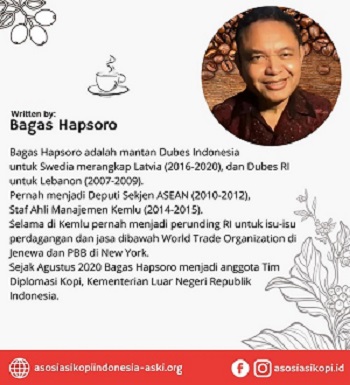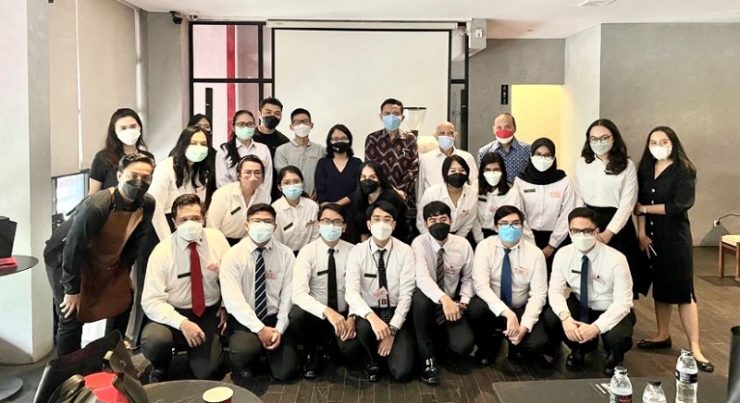AFTER many years of successful implementation of economic diplomacy, starting November last month, the Indonesian Ministry of Foreign Affairs introduced a coffee education program for its diplomats. The Junior Diplomatic Training (Sekdilu)’s curriculum entitled “Introduction to Nusantara Coffee” includes a training, both in theory and practice, of becoming a barista.
To what extent has the Ministry of Foreign Affairs made coffee one of the main subjects at the Diplomat Center? There is no limit to this, considering that coffee is interesting to learn and to know by anyone. Aside from becoming a part of lifestyle for young people, coffee is also closely related to culture and provides economic benefits for the country that produces and exports coffee beans. The growth of coffee production in the past 13 years is undeniably impressive.
Between 2008 to 2020, the volume of Indonesian coffee exports increased by an average growth rate of 4.5% per year. [Source: Direktur Tanaman Tahunan dan Penyegar, Directorate General of Plantations, Ministry of Agriculture, 23 September 2021, “Six roles of coffee in the economy”].
President Jokowi on August 15, 2021 expressed his delight that the agricultural sector, including coffee, was one of the sectors that were able to withstand the blows of the COVID-19 pandemic, where exports in 2020 reached IDR451.8 trillion, or an increase of 15.79% compared to 2019, which was at IDR390.6 trillion. [Source: Suara.com, August 15, 2021, President Jokowi: The Agricultural Sector Can Survive the Impact of the COVID-19 Pandemic].
The Challenges Ahead
While the prospects for coffee remain promising, no one should underestimate the challenges; starting from environmental issues, sustainability, human rights, health, competition, quality demands and labeling. This external impact is further exacerbated by the limited number of tools to facilitate post-harvest and processing equipment for added value, in line with the infrastructure development and implementation of Good Agricultural Practice appealed by European Union countries.
Another problem is the incompatibility of upstream and downstream handling coordination, as well as collaboration between institutions. This can only be overcome through capacity building for policy makers, including through technical guidance and training.
There are opportunities that need to be seized in terms of technology, sustainability and traceability. According to the Ministry of Information and Communication, the increase in the use of online business in Indonesia from 2020-2025 is 370% and the highest in ASEAN. [Source: Prof. Dr. Henri Subiakto, Expert Staff to the Minister for Communication and Information, 12 July 2021].
In addition, with technology, coffee productivity will increase rapidly, including the addition of product quality. The development of digitalization has also greatly helped the development of coffee technology, both in terms of production and sales.
According to the International Coffee Organization’s October 2021 report, in September 2021, coffee prices hit new record highs as the monthly average ICO composite indicator price was 170.02 US cents/lb, an increase of 6.2% compared to August 2021 at 160.14 US cents/lb. These price levels during the 2020-2021 period confirm the recovery experienced over the last three coffee years. [Source: Monthly ICO report, October 2021: Coffee prices further increases in September 2021].
However, Indonesia also needs to think about the sustainability aspect, especially due to climate change, where the role of conservation is so important. Otherwise, the world would face the catastrophe of environmental destruction.
Lesson learnt from Colombia
Indonesia can learn from Colombia to popularize specialty coffee. In the 70s and 80s, the Colombian government raised its coffee production target from commercial coffee to specialty coffee. Now, Colombia has become one of the best specialty coffee producers in the world. The narrative about specialty coffee is therefore enhanced, with the quality of the soil and health aspects highlighted.
People who drink specialty coffee need stories on how the coffee is produced, where baristas can pave the way to have Indonesian specialty coffee promoted; starting from coffee samples then potentially increasing to orders that are worth thousands of tons.
We need to show the origins of Indonesian specialty coffee and focus on its diversity. Of course, quality packaging cannot be ignored. Thus, an Indonesian coffee customer abroad can imagine sitting on the beach while sipping Bali Kintamani or simply enjoy the view while drinking Toraja Coffee.
Education and the role of millennials
Another important aspect of Indonesian specialty coffee is culture; seeing Indonesian coffee as a hereditary tradition and habit. An example is “kopi tubruk” (ground coffee). We ought to educate our consumers that Indonesian specialty coffee is known and can be widely accepted in foreign countries.
Education and socialization about specialty coffee in Indonesia needs to be carried out not only from upstream, downstream activities to consumers, but also to the main target market, especially young people. A coffee observer named Salendra in 2014 predicted that the generation that can regulate the market is millennials. His prediction has now been proven; millennials are the largest segment of coffee lovers both in shops and cafes. [Source: Salendra, “Coffee Shop as a Media for Self-Actualization Today’s Youth”, July 2014 in the Messenger Journal].

















